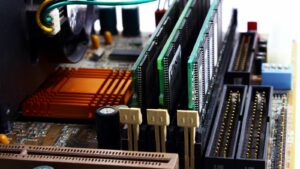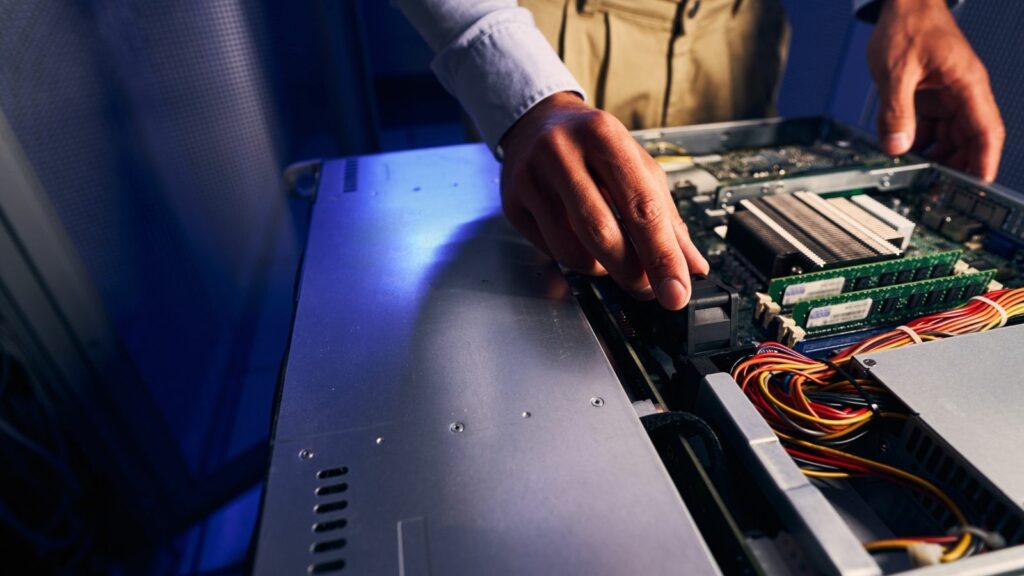”
Key Takeaways
- Growing Demand: The need for skilled computer hardware engineers is increasing due to rapid technological advancements, presenting unique career opportunities.
- Educational Pathway: A bachelor’s degree in computer engineering, electrical engineering, or computer science is essential, with certifications like Certified Hardware Engineer (CHE) enhancing job prospects.
- Core Skills Needed: Success in this field requires a combination of technical skills, including proficiency in CAD software, analytical problem-solving, and strong communication abilities.
- Hands-On Experience: Internships and entry-level positions provide practical exposure, allowing aspiring engineers to apply theoretical knowledge and build professional networks.
- Specialization Opportunities: Focusing on areas such as embedded systems, robotics, or networking can improve career prospects and allow for advancement in specific niches.
- Networking Importance: Engaging in professional networking through conferences, organizations, and online platforms is crucial for career advancement and staying updated on industry trends.
In today’s tech-driven world, the demand for skilled computer hardware engineers is skyrocketing. These professionals play a crucial role in designing, developing, and testing the physical components of computers, from circuit boards to processors. With the rapid advancement of technology, aspiring engineers have a unique opportunity to shape the future of computing.
Becoming a computer hardware engineer requires a blend of education, practical experience, and a passion for innovation. From obtaining a relevant degree to honing technical skills through internships, the journey is both challenging and rewarding. This guide will explore the essential steps to embark on a successful career in this dynamic field, ensuring that aspiring engineers are well-equipped to meet the industry’s evolving needs.
How To Become A Computer Hardware Engineering
Computer hardware engineering involves the design, development, and testing of computer components such as processors, circuit boards, and memory devices. This field merges principles from electrical engineering and computer science to create systems that meet user needs and performance standards.
Key Responsibilities
 Designing computer systems and components by using software tools for simulations and modeling.
Designing computer systems and components by using software tools for simulations and modeling.- Testing prototypes to ensure functionality, reliability, and compliance with specifications.
- Troubleshooting hardware issues through systematic analysis to identify and rectify faults.
- Collaborating with software engineers to ensure compatibility between hardware and software systems.
Required Skills
- Analytical skills enable engineers to solve complex problems effectively.
- Technical proficiency in using CAD software and programming languages is essential for designing systems.
- Attention to detail ensures accuracy in designs and testing processes.
- Communication skills facilitate collaboration with teams and clear documentation of processes.
Educational Path
Typically, a bachelor’s degree in computer engineering or a related field is the starting point. Coursework often includes electrical engineering, computer architecture, and circuit design.
Certifications and Licenses
Certifications such as the Certified Hardware Engineer (CHE) can enhance career opportunities. Keeping updated with industry trends and advancements through continuous education is vital for career growth.
Understanding these core elements provides a foundation for aspiring hardware engineers to navigate this dynamic and evolving field effectively.
Educational Requirements
Aspiring computer hardware engineers must pursue specific educational paths and certifications to thrive in this competitive field. These qualifications ensure a solid foundation in the necessary skills and knowledge.
Relevant Degrees
Degrees in computer engineering, electrical engineering, or computer science provide essential knowledge for a career in hardware engineering. Most positions require at least a bachelor’s degree, where students learn vital topics such as digital design, circuit analysis, and embedded systems. Advanced degrees, like a master’s, can enhance job prospects and may focus on specialized areas such as robotics or machine learning. Some common degree options include:
- Bachelor of Science in Computer Engineering: Focuses on both hardware and software design, integrating knowledge from electrical engineering and computer science.
- Bachelor of Science in Electrical Engineering: Emphasizes electrical systems and circuits, fostering skills applicable to hardware components.
- Bachelor of Science in Computer Science: Offers a broader perspective on computing that benefits hardware engineers in software integration.
Certification Programs
Certification programs can supplement academic degrees and improve career opportunities for computer hardware engineers. They demonstrate expertise and commitment to the field. Notable certifications include:
- Certified Hardware Engineer (CHE): Validates skills in hardware design and testing, recognized by industry professionals.
- Certified Electronics Technician (CET): Offers credibility in electronics troubleshooting and design, appealing to employers.
- Cisco Certified Network Associate (CCNA): Provides network fundamentals, beneficial for engineers working with networking hardware.
Pursuing these educational paths and certifications equips engineers with the qualifications necessary for success in computer hardware engineering.
Skills Necessary for Success
A successful computer hardware engineer possesses a mix of technical and soft skills. These competencies enable professionals to tackle complex challenges in hardware design and development efficiently.
Technical Skills
- Analytical Problem-Solving: Engineers analyze technical issues, develop solutions, and optimize designs to improve performance.
- Proficiency in CAD Software: Mastery of tools like AutoCAD or SolidWorks aids in creating detailed designs and schematics for hardware components.
- Programming Languages: Familiarity with languages such as C, C++, or assembly enhances the ability to interface hardware with software applications.
- Circuit Design Knowledge: Understanding digital and analog circuits allows engineers to create and modify component designs effectively.
- Testing and Troubleshooting: Skills in testing prototypes for functionality, diagnosing failures, and implementing corrective actions are essential for reliability.
- System Architecture Understanding: Knowledge of how different hardware components interact within a system contributes to successful overall design.
- Strong Communication Abilities: Effective communication fosters collaboration between hardware and software teams and ensures clear documentation of designs and processes.
- Attention to Detail: Precision in design and implementation minimizes errors and enhances the overall quality of hardware products.
- Team Collaboration: Working cohesively in multidisciplinary teams encourages innovative problem-solving and project success.
- Time Management: Prioritizing tasks and managing deadlines enables engineers to complete projects on schedule while maintaining quality.
- Adaptability: Flexibility in adapting to new technologies or methodologies helps engineers stay current in a rapidly evolving field.
Gaining Experience
Gaining hands-on experience is crucial for aspiring computer hardware engineers. Practical exposure enhances theoretical knowledge and develops essential skills in real-world applications.
Internships and Co-ops
 Internships and co-op programs provide invaluable experience. These opportunities allow individuals to work alongside professionals in the field, gaining insights into design processes, component testing, and troubleshooting.
Internships and co-op programs provide invaluable experience. These opportunities allow individuals to work alongside professionals in the field, gaining insights into design processes, component testing, and troubleshooting.
Interns typically assist with tasks such as creating prototypes, conducting experiments, and analyzing performance data. Engaging in internships or co-ops also helps build professional networks, which can result in job offers after graduation.
Entry-Level Positions
Entry-level positions serve as a foundation for a successful career. Roles like junior hardware engineer or technician involve supporting senior engineers in developing and testing hardware components. Responsibilities may include assembling devices, performing quality checks, and providing technical support. These positions allow individuals to refine their skills, learn industry standards, and understand the project lifecycle in hardware engineering.
Career Advancement
Career advancement in computer hardware engineering involves exploring specializations and engaging in networking opportunities to foster development. Professionals can enhance their expertise and increase their marketability through targeted skills and connections within the industry.
Specializations in Hardware Engineering
Specializations allow computer hardware engineers to focus on specific areas within their field, improving career prospects and expertise. Options include:
- Embedded Systems: Engineers design and develop hardware for embedded applications, often used in consumer electronics and automotive systems.
- Robotics: Engineers work on the integration of hardware and software systems for robotic applications, requiring knowledge in mechanics, electronics, and programming.
- Network Design: Engineers focus on hardware solutions for networking, including routers, switches, and security appliances.
- Consumer Electronics: Engineers develop hardware for products like smartphones, tablets, and gaming consoles, staying current with market trends and consumer needs.
- Server Architecture: Engineers design and optimize hardware for data centers, focusing on performance, energy efficiency, and reliability.
Focusing on one or more of these specializations enables engineers to distinguish themselves in the job market and take advantage of emerging trends.
Networking and Professional Development
Networking plays a critical role in career advancement for computer hardware engineers. Building relationships within the industry leads to potential job opportunities and collaboration. Strategies include:
- Industry Conferences: Attending events such as IEEE conferences allows engineers to connect with peers and leaders, sharing knowledge and insights.
- Professional Organizations: Joining groups like the IEEE or ACM provides access to resources, events, and a network of professionals.
- Online Platforms: Utilizing professional networking sites like LinkedIn helps engineers build an online presence, showcasing skills and connecting with industry professionals.
- Mentorship Opportunities: Seeking mentors within the field can provide guidance and insights, helping engineers navigate career paths and industry challenges.
Engaging in networking and professional development fosters continuous learning and growth, essential for staying competitive in the evolving field of computer hardware engineering.
Professional Development Fosters Continuous Learning And Growth
Becoming a computer hardware engineer offers a rewarding career filled with opportunities for innovation and growth. By pursuing the right education and gaining practical experience, individuals can position themselves for success in this dynamic field.
Developing both technical and soft skills is crucial for navigating the complexities of hardware design and collaboration. As technology continues to evolve, staying updated through networking and specialization will enhance career prospects.
With dedication and a passion for technology, aspiring engineers can thrive in a profession that’s not only essential but also exciting and ever-changing.
“

